
Health Benefits of 10 Ayurvedic Superfoods You Should Include In Your Daily Diet !
The basic principle of Ayurveda is to prevent and treat illness by maintaining balance in the body, mind, and consciousness through proper drinking, diet, and lifestyle, as well as herbal remedies.In Ayurveda the food eaten should have at least one of six tastes – sweet ( मधुर , मीठा ), sour ( अम्ल , खट्टा ), salty ( लवण , नमकीन ), bitter ( तिक्त , कड़वा ), pungent (कटु , चरपरा) and astringent (कषाय , कसैला ). If you are seeking to accomplish all of them, then include the below given Ayurvedic Superfoods in your daily diet.

1. Ashwagandha
Ashwagandha (Withania Somnifera or Indian Ginseng or Winter Cherry) is an ancient medicinal herb well-known for its benefits, including a dual capacity to energize and calm at the same time.With the powerful health benefits for fertility, athletic performance, sleep, and is known to reduce blood sugar levels due to its effects on insulin secretions. Hence, it should come as no surprise that the versatile ashwagandha can help you manage and reduce anxiety as well.
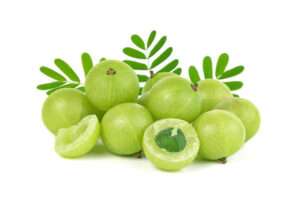
2. Amla
Amla (Phyllanthus emblica) also known as Indian gooseberry is a tree native to India and the Middle East. It's been used in Ayurvedic medicine for thousands of years. It seems to work by reducing total cholesterol levels, including the fatty acids called triglycerides, without affecting levels of high-density lipoprotein (HDL or "good") cholesterol. Rich in Vitamin A, Amla supports eye health, and is used as an eye wash in India. Studies suggest that amla contains 20 times more Vitamin C than oranges, which makes it the healthiest food option. Additionally, amla also consists of chromium, a mineral that regulates carbohydrate metabolism and make body more responsive to insulin.

3. Ghee
Ghee or clarified butter as it's commonly known, is a gem of Ayurveda. It plays a vital role as a medicine in Ayurveda. It is extremely nutritious and helps you stay healthy by supporting your immune system, and is commonly used in India for cooking, as a traditional medicine, and for religious rituals. “Clarified butter actually lowers cholesterol, thanks to its content of omega-3 fatty acids, and helps improve heart health.” Studies have proved that adding ghee to your meals reduces the glycaemic index of food and It also helps maintain healthy eyesight and skin.
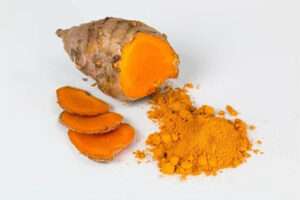
4. Turmeric
Turmeric :The Golden Spice. It is a traditional Indian spice with a powerful compound called curcumin. It is used widely in Ayurvedic medicine and cooking. It is a flowering plant, Curcuma longa, of the ginger family, Zingiberaceae, the rhizomes of which are used in cooking. Turmeric is packed with ant-inflammatory properties. It is a powerful anti-inflammatory herb that’s been used for thousands of years to promote whole-body health and holistic well-being. This ancient Ayurvedic root, which is a cousin to ginger, is native to Southeast Asia and sometimes called "Indian saffron" because of its beautiful golden color. It also gives the food its yellow pigment. Turmeric and its healing benefits is fast becoming a global phenomenon. The most powerful herb of Ayurveda helps with digestion and weight loss by not allowing fat accumulation. When combined with milk, it makes for an excellent health tonic called turmeric milk, also popularly called Golden milk. This drink balances all 3 dosha. It also reduces inflammation, lowers stress, boosts immunity, detoxifies the body, and even supports cancer prevention.
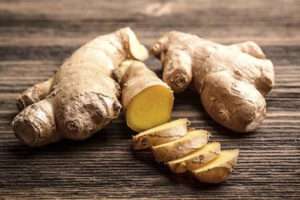
5. Ginger
Ginger is a flowering plant whose rhizome, ginger root or ginger, is widely used as a spice and a folk medicine. It is a herbaceous perennial which grows annual pseudo stems about one meter tall bearing narrow leaf blades. It is a well-known ingredient that is found not only in a majority of Indian and western dishes. It is a superfood that can help to provide relief from ailments including nausea, cold, flu, and cough. Ginger is rich in compounds with numerous beneficial health effects throughout the body. It has potential antioxidant, antidiabetes, anti-inflammatory, anticancer, weight-loss-friendly, and brain- and heart-protective effects. Dried ginger root works well on joint pains (mix with almond oil and rub on painful areas), as well as migraines, and helps lower cholesterol levels.

6. Tulsi
Tulsi (Ocimum tenuiflorum), commonly known as holy basil, is an aromatic perennial plant in the family Lamiaceae. It is native to the Indian subcontinent and widespread as a cultivated plant throughout the Southeast Asian tropics. “In Ayurveda, tulsi leaves, ginger and cardamom boiled in water make for a healing potion to treat sore throats, headaches and chest congestion.” However, Ayurveda suggests consuming tulsi as a preventive measure as well as a remedy to fight stress and anxiety due to the presence of antioxidants. Tulsi is rich in Vitamin C and zinc. It thus acts as a natural immunity booster and keeps infections at bay. It has immense anti-bacterial, anti-viral and anti-fungal properties which protect us from a variety of infections. Juice of Tulsi leaves mixed with honey and ginger is effective in bronchitis, asthma, influenza, cough and cold. It has anti-bacterial and anti-viral properties which help to fight infections, thus reducing fever. The fresh juice of Tulsi taken with black pepper powder cures periodic fevers.
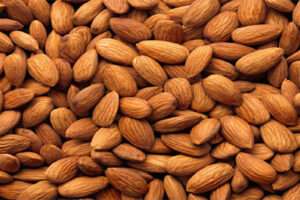
7. Almond
The almond is a species of tree native to Iran and surrounding countries, including the Levant. Almonds are a good source of zinc, strengthen the body and grounding for the mind. Although they contain a high number of calories, almonds can actually help to reduce your risk of weight gain and obesity. It can help lower your systolic blood pressure, which offers even more protection against heart disease. They are rich in Essential Vitamins, Minerals, and Fiber, the valuable nutrients for your body, like magnesium, vitamin E, and dietary fiber. Almonds have calcium and phosphorus, which improve bone health and can protect you from fractures. Almonds are a healthy and delicious snack that can bring some real benefits to your physical health. Because they're so versatile and convenient, it's easy to fit them into your diet. .

8. Honey
Honey, the golden-colored liquid, is an important medicine that is not a plant but a by-product. In Ayurveda, it is used for both internal and external applications. It is used as a treatment for skin burns, rashes, hiccups, indigestion, weight loss, and worm infestation. It has numerous health benefits. Raw honey is a rich source of antioxidants called polyphenols. Having a spoonful daily can have many health benefits. Make sure to buy good quality, organic honey. Fresh honey increases body mass whereas old honey decreases body mass but results in constipation. Honey was first and foremost used for wound healing during the old days. It heals nearly all types of wounds—cuts, sores, ulcers, amputations, surgical wounds. It is another natural remedy for treating cough, cold, and sore throat. Many studies have concluded that honey is helpful for oral hygiene. It prevents gum inflammation and the formation of dental plaques that lead to tooth decay. The ancient Vedic civilization considered honey as one of nature’s most remarkable gifts to man.

9. Moringa
Moringa Oleifera is beginning to gain more popularity as a new nutritious superfood. Simply put, this herb is one of the most effective & essential medicinal plants in Ayurveda. It is a fast-growing, drought-resistant tree of the family Moringaceae, native to the Indian subcontinent. Moringa is also called the drumstick tree or the Miracle tree and ben oil tree or benzolive tree. Moringa is also valued for its ability to balance blood sugar, and may play a role in cardiovascular health. It is proven to be rich in anti-inflammatory compounds and can work against dandruff and other scalp sensitivities. It is a beloved herbal superfood with tremendous nutritious content that supports the body's overall vitality, immunity, and well-being.
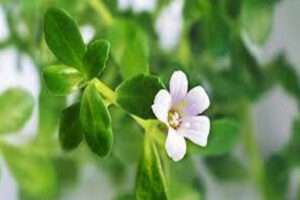
10. Brahmi
Brahmi (derived from the name of Lord Brahma and Goddess Saraswati) is a perennial herb most well known for its memory enhancing property. It has been used in traditional Indian medicines by Ayurveda. Brahmi (Bacopa Monnieri or WaterHyssop) is excellent for improving your brain functions and strengthening your memory. Brahmi tea that is made by brewing Brahmi leaves helps to manage cold, chest congestion and bronchitis. It also reduces pain and inflammation in the throat and respiratory tracts due to its anti-inflammatory property. Taking Brahmi powder along with milk helps improve brain functions by preventing brain cell damage caused by free radicals due to its antioxidant property Applying Brahmi oil to the scalp helps prevent hair loss as it nourishes and provides strength to the hair. It is traditionally mixed with sesame oil, and used to massage away stress and soothe the nerves. ..This herb is also helps sustain brain and nervous system functions. Brahmi might increase certain brain chemicals that are involved in thinking, learning, and helps improve memory power.